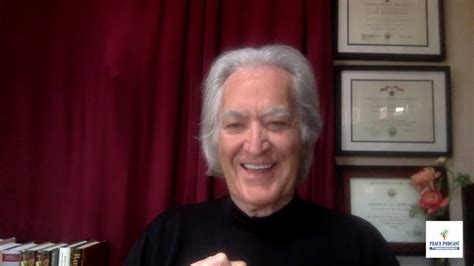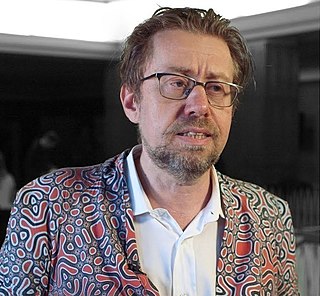A Quote by Frederick Lenz
Meditation is a practice of detaching and then stopping ourselves from thinking; our thoughts are interruptions in the flow of awareness. Consciousness, in its highest aspect, is perfect and formless.
Related Quotes
According to the true Indian view, our consciousness of the world, merely as the sum total of things that exist, and as governed by laws, is imperfect. But it is perfect when our consciousness realizes all things as spiritually one with it, and therefore capable of giving us joy. For us the highest purpose of this world is not merely living in it, knowing it and making use of it, but realizing our own selves in it through expansion of sympathy; not alienating ourselves from it and dominating it, but comprehending and uniting it with ourselves in perfect union.
Transcendental meditation is one particular form of mantra meditation that allows your mind to experience progressively abstract fields of awareness. And ultimately you settle down in the space between your thoughts. The space between your thoughts is pure consciousness, and it's a field of possibilities. It's a field of creativity. It's a field of correlation. It's also a field of uncertainty. It's also a field where intention actualizes its own fulfillment. So that meditation allows you to contact this field, which is very primordial - the ground state of our existence.
Meditation means awareness. Whatsoever you do with awareness is meditation. Action is not the question, but the quality that you bring to your action. Walking can be a meditation if you walk alertly. Sitting can be a meditation if you sit alertly. Listening to the birds can be a meditation if you listen with awareness. Just listening to the inner noise of your mind can be a meditation if you remain alert and watchful. The whole point is: one should not move in sleep. Then whatsoever you do is meditation.
It is only through meditation that we can get lasting peace, divine peace. If we meditate soulfully in the morning and receive peace for only one minute, that one minute of peace will permeate our whole day. And when we have a meditation of the highest order, then we really get abiding peace, light and delight. We need meditation because we want to grow in light and fulfill ourselves in light. If this is our aspiration, if this is our thirst, then meditation is the only way.
So when we sing, 'Draw me nearer, nearer, blessed Lord,' we are not thinking of the nearness of place, but of the nearness of relationship. It is for increasing degrees of awareness that we pray, for a more perfect consciousness of the divine Presence. We need never shout across the spaces to an absent God. He is nearer than our own soul, closer than our most secret thoughts.
When you climb a ladder and arrive on the sixth step and you think that is the highest, then you cannot come to the seventh. So the technique is to abandon the sixth in order for the seventh step to be possible. And this is our practice, to release our views. The practice of nonattachment to views is at the heart of the Buddhist practice of meditation.
Meditation is object-less. If you use any object, then it is not meditation; it becomes thinking. It becomes contemplation; it becomes reflection, but not meditation. This is the most essential point to be understood. This is the essence of a meditative state: that it is object-less. Only consciousness is there, but not conscious ABOUT anything. Consciousness without being conscious of anything - this is the nature of meditation.
The cognitive structure does not generate consciousness; it simply reflects it; and in the process limits and embellishes it. In a fundamental sense, consciousness is the source of our awareness. In other words, consciousness is not merely awareness as manifest in different forms but it is also what makes awareness possible.
I realized that most thoughts are impersonal happenings, like self-assembling machines. Unless we train ourselves, the thoughts passing through our mind have little involvement with our will. It is strange to realize that even our own thoughts pass by like scenery out the window of a bus, a bus we took by accident while trying to get somewhere else. Most of the time, thinking is an autonomous process, something that happens outside of our control. This perception of machine-like quality of the self is something many people discover, then try to overcome, through meditation.
































